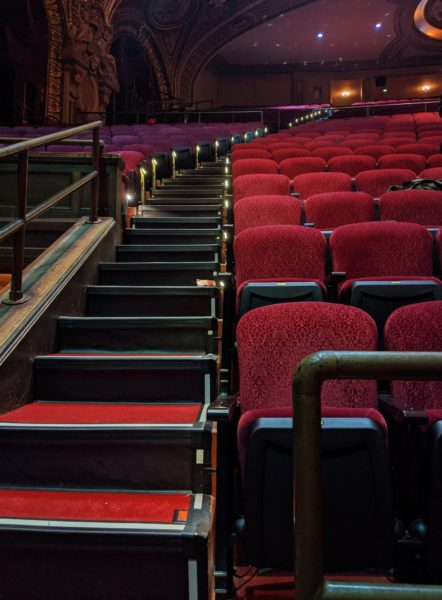
Cinemas in New York City will be required to program at least a quarter of their showtimes using open-captions according to a new bill passed by City Council. The bill, Intro 2020, will require NYC cinemas with multiple weekly screenings to offer open-captioning for 25 percent of each film’s showtimes (up to 4 screenings of each film per week) with on-screen subtitles—half of which must be during “peak” hours.
Current regulations from the Americans with Disability Act favor closed-caption systems in movie theaters, which offer closed-captioning for individual patrons at cinemas who request seat-specific devices. Intro 2020 will instead dedicate entire showtimes to open-caption technology. A statement from the New York City council claiming the existing closed-caption system “fails far too often” and “unfairly burdens users who must request and return viewing devices, and poses health risks because the devices are then passed on to the next user.”
The central provisions of Intro 2020 include:
- Applicable to any theater offering more than 10 movie showings per week.
- Open-captioning must be offered for at least one quarter of screenings of films which have four or more showings per week, with certain exceptions.
- Theaters are required to offer up to 4 open-captioned screenings per week for any film.
- Theaters must indicate which showings have open-captioning and advertise all films in the same manner.
Intro 2020 also mandates that half of the required open-captioned showtimes each week be during “peak” moviegoing times, defined as 6 to 11pm Monday through Friday and 11:30am to 11pm on Saturday & Sunday, with certain exceptions for films not normally shown during peak times. An additional one-quarter of open-captioned showings must be during “secondary” peak times, defined as Monday through Thursday evenings.
Theaters who do not comply with the new open-captioning requirements are subject to a civil penalty of $100 to $500 per violation. Records of open-captioned showings must be kept for 3 years.
Over time, local government and accessibility advocates will review the data regarding open-captioned showings in New York City and may have the opportunity to adjust the legislation.
A representative of NATO of New York provided a statement to Boxoffice Pro, stating the association’s support of initiatives in support of deaf and hard of hearing audiences while criticizing the specific bill in question:
“Our members believe that this bill remains unworkable, impractical, and will be damaging economically for theaters as they attempt to recover from severe pandemic-related losses. We are committed to making sure that the deaf and hard of hearing community feels welcome and included at our member theaters, which is why we offered a far more comprehensive open caption proposal. However, INT-2020-A is a rushed, complicated, and deficient approach. Proceeding with this inflexible mandate that micromanages operations, as opposed to the manner that the theaters suggested, will exacerbate the dire economic conditions facing theaters by subjecting them to further losses or fines. Data and experience from multiple jurisdictions shows that audiences do not turn out for open caption showtimes, and this legislation will mandate that theaters play movies to largely empty audiences. Theaters around the country are struggling to get audiences to return because of the pandemic, and face increasing competition from at-home streaming options, which is leading to many theaters closing permanently. Simply put, closed theatres cannot play open caption movies.”


Share this post